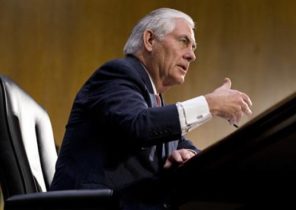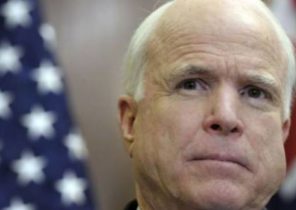Hong KONG — governments around the world faced a terrible choice: to save people’s lives from сovid-19 or to protect their sources of income and livelihood. Economic indicators underscore the severity of this dilemma. Unemployment rose sharply, the volume of foreign trade fell sharply, the global economy is on the verge of the worst recession since the great depression. And there’s only one way to soften the economic impact of a pandemic is to develop Sino-American cooperation.
It is no secret that China and the US in recent times don’t get along. Since the White house has settled the President, Donald trump, his administration is pursuing an aggressive policy of containment of China, using the preferred weapon trade barriers.
Crisis сovid-19 is not just not changed these sentiments, but, apparently, on the contrary, reinforced the administration’s desire to trump hostility — to the extent that dumping on China of the blame for the pandemic seems to her more important task than the protection of Americans. In a new document entitled “a Strategic approach to the people’s Republic of China” the trump again leads his rationale: that “sober” evaluation confirmed that China is a strategic competitor in the field of economy, ideology and national security.
United States, the document says, do not “seek to stop the development of China” and “welcome increased cooperation with China and work on common objectives.” However, the interaction between America and China will be “selective and result-oriented”, and always contributing to the promotion of U.S. national interests.
In conditions when the number of deaths from сovid-19 in the United States exceeded 100 million, America has no more important interest than the fight against the pandemic coronavirus. In addition, in a situation where in just the past nine weeks, more than 38 million Americans filed applications for unemployment benefits, cooperation is particularly valuable from the point of view of restricting the economic costs of the pandemic.
Make no mistake: to confront the threat that knows no national boundaries, and to protect the economy that is deeply integrated with the rest of the world, it is impossible alone. But it is not clear that for the United States these vital tasks will become a higher priority than geopolitical rivalry.
On the contrary, in April, the U.S. Department of Commerce imposed new restrictions against the Chinese giant Huawei, and the Senate has passed a law that could lead to the delisting of some Chinese companies whose shares are traded on US exchanges. Recognizing that there is “broad scientific consensus that the virus was not man-made or genetically modified”, the US Secretary of state Mike Pompeo, however, said recently that there is “plenty of evidence” pointing to its origin from a Chinese lab.
On the background of acute emotional and economic injuries to the desire to find and punish the culprit may, of course, seem extremely tempting. For trump, this topic has become Central to his campaign — and is a convenient way to avoid accusations of mistakes made by his own administration in the fight against the pandemic. But history shows the folly of this approach: the decision to punish countries who lost in world war I, created conditions for beginning of the great depression, and eventually led to a new world war.
Today, the stakes are equally high. The pandemic has given a turbo boost dangerous political and economic trends — from nationalism to digital inequality among workers and enterprises. Rising unemployment, coupled with natural disasters caused by climate change, and outbreaks of disease will only aggravate the discontent.
Many governments hope that the massive monetary and fiscal stimulus will be enough to save the economy. According to the International monetary Fund, the developed countries (especially USA and Europe) have pledged to provide budget support amounting to $9 trillion. In the US the congressional Budget office predicts that in 2020 the country’s budget deficit will amount to $3.7 trillion, or 17.9% of GDP.
China also uses fiscal incentives, although to a much lesser extent. These measures, which relate more to reduce taxes and fees from businesses and households (for a total amount of 2.5 trillion yuan, or $350 billion), will increase the budget deficit only slightly to 3.6% of GDP.
And while the US Federal reserve is conducting monetary easing on an unprecedented scale (by mid-may, his balance increased by almost $3 trillion), the people’s Bank of China has not followed suit, but prefers to demand from commercial banks to expand lending to enterprises and governments at the local level. For the first four months of the year, total loans denominated in RMB, increased by 10.7% (yoy). In addition, the budgets of local authorities will receive support through the sale of coronavirus bonds worth 1 trillion yuan.
Despite the enormous stimulus measures, the real GDP of America is expected to decrease by 39.6% in the second quarter of 2020, and 5.6% for the year. All this is due to an uncomfortable truth: most of the implemented monetary and fiscal measures to solve a temporary problem with cash flow. The world must change model of business and employment, equipping them with new tools for the era after the pandemic, and this will require large-scale investments at the local, national and global levels.
Unlike USA, China is clearly aware. Speaking recently at the opening of the third session of vsekitajsky meeting of national representatives of the 13th convocation, Prime Minister Li Keqiang did not mention the target level of GDP for this year, noting that the government will always adhere to the approaches according to the principle of “People foremost”. Lee also pledged to work together with the United States on the implementation of trade agreements “first phase”, signed in January.
America must realize that it is an escalation of geopolitical rivalry with China’s little strategic sense. As shown by the last few decades, global cooperation, especially in trade — is a real, mutually beneficial strategy, but a trade war and geopolitical competition with zero-sum, undermine prosperity for all.
In addition to conducting two strategy games, the United States is a long — standing global leader, have a moral obligation to help the rest of the world to avoid the trap of depression Covid-19, which is more dangerous and relevant than the so-called “Thucydides trap”. However, judging by recent signals, we do not count on it.







